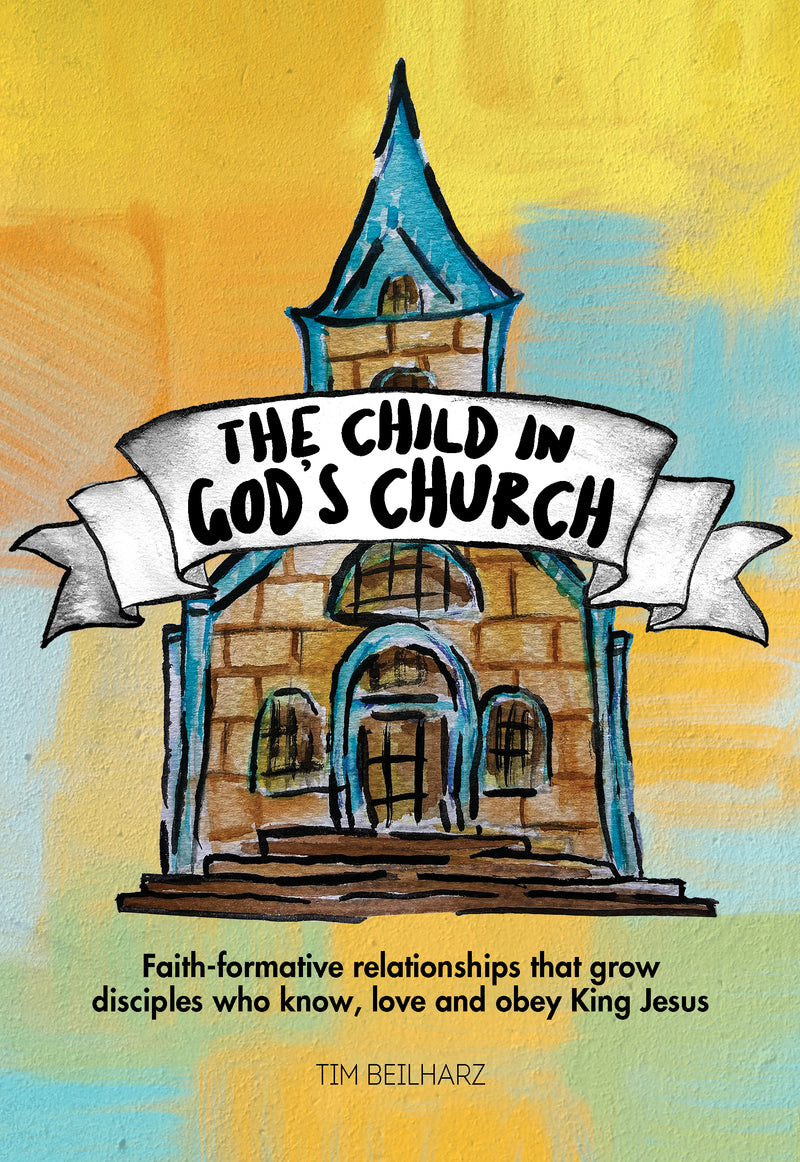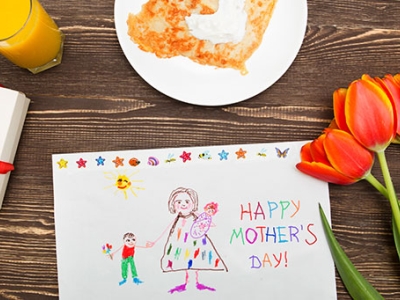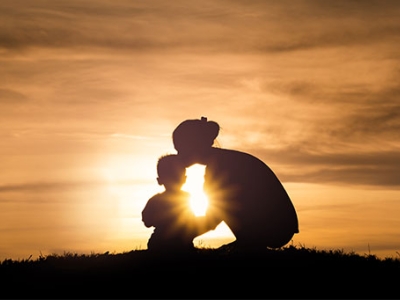
What parents of only children want you to know
Mother’s Day reflections from Rebecca Sharley.
The hidden grief of Mother’s Day
Mother’s Day is a great chance to celebrate mothers. It’s also a day with so much hidden grief that celebrating at all can feel too tricky. How do we rejoice and give thanks for good mothers and the good gift of motherhood, without hurting those who don’t have that story to tell or who are grieving the loss of those things?
I’ve spent Mother’s Day as a single woman, I’ve spent it as a married woman longing for a child, and I’ve seen it as an angry grieving mess after multiple miscarriages. I spent one memorable Mother’s Day 35 weeks pregnant and exhausted. And now I spend Mother’s Day chasing my toddler, rejoicing in her as a good gift from God, and mourning that she will mostly likely be my only living child.
There are so many reasons Mother’s Day can be sad or hard or just very complicated. Our relationships with our mothers and our desires for motherhood are impacted by the reality of parenting in a broken world. This means that something that should be simple and joyful is instead mixed with grief and difficulty. I can’t speak to all the ways Mother’s Day might be hard for you or someone you know. If I tried, I would forget someone and do exactly what I am trying not to do.
So, if Mother’s Day is hard for you in any way, I want to stop and acknowledge that. God sees and understands your pain, and I am praying that he will be putting people around you on this day who also see and understand your pain and love you through this day and all days.
Because it is a part of my story, today I want to acknowledge the difficulties (and some joys) that come with being the parent of only one child. This is not to diminish the experiences of those at either end of the spectrum—from those who do not have children to those who are managing large families. Even though my struggle with Mother’s Day is not unique, by talking about it, I hope others who might feel invisible on this day instead feel empowered to talk about their own experiences.
The assumptions we make
So often, when out and about with my toddler, I get unsolicited enquiries about whether she has siblings or when I will have my next child. There are so many assumptions that go with these comments or questions that often I am left unable to even begin to answer.
Of course, usually the speaker isn’t trying to cause hurt—they just want to make conversation. Many even feel bad and apologise if they realise that they’ve made assumptions without thinking. Nevertheless, it’s a conversation—and a tug of the heartstrings—that I experience regularly.
Sometimes, with friends or those I’d like to get to know better, I can answer honestly and say ‘Well, she’s my third pregnancy actually, but the only one who lived’, or ‘She will probably be our only child’. It’s hard to share and be vulnerable. But often what I am most self-conscious about is admitting that my life has not followed the perfect roadmap I expected: meet someone, get married, then have a few kids—all according to our own schedule and planning, as though we are in control of it all.
In Christian communities, it can sometimes feel like everyone else is following this perfect roadmap with ease. If you are single, dealing with infertility, or grieving empty spaces at your dining table, it can be easy to assume no-one else is struggling, especially when you’re surrounded by engagement parties, weddings, baby showers and kids’ birthday parties.
There are unique struggles in having a larger family of course. But there are also plenty of families in our churches who wish they even had the option to face the challenges that come with an abundance of children. My prayer is that our Christian communities can be a soft landing-place for those struggling with infertility or thwarted dreams of what their family should look like, as well as a support for those growing and managing multi-kid families. We are very good at rejoicing with those who rejoice, welcoming babies and children into families and communities. We aren’t as good at mourning with those who mourn, especially if that mourning is unspoken, invisible or complex.
Remembering the Giver of life
The roadmap we often expect—of marriage and kids—is partly expected because for most people, it is what happens. But we know these things aren’t guaranteed by God. When we forget who the Giver of life is and assume these things will follow our own plans, we set ourselves up for disappointment. James warns against this in the New Testament:
Now listen, you who say, ‘Today or tomorrow we will go to this or that city, spend a year there, carry on business and make money’. Why, you do not even know what will happen tomorrow. What is your life? You are a mist that appears for a little while and then vanishes. Instead, you ought to say, ‘If it is the Lord’s will, we will live and do this or that’. James 4:13–15
I mentioned earlier the difficulties and joys of having an only child. One of the unexpected joys is that because for so long we thought we wouldn’t hold a living child, when we did, we knew completely and totally that she was a good gift from our good Heavenly Father. The roadmap that assumes we are in control of our family planning can mean we take for granted what a miracle it is when God gives us any children at all. God is the one who gives children and equips us to love them and raise them to know him. Trusting God in all things, even my fertility, has strengthened my trust in God in other areas of my life as well.
The truth is my daughter is an only daughter by choice and not by choice. In different circumstances I would have loved two or three children. But just as we are called to be wise with all our resources, having more children or trying to have more children would not be a wise stewarding of my health or our finances, at least not in our particular circumstances. A second baby could be a good thing for many to pursue, but it is not for us.
Siblings in the family of God
Many people in our churches and communities are grieving similar decisions or living in expectant hope that the story might change. A big worry for parents of only one child is that their child will miss out by not having siblings. It’s true there are experiences of sibling love (and fighting!) that only children won’t necessarily experience in the same way, but the church family has an opportunity here to act as a family and take our siblings-in-Christ relationships seriously. We can do this by fostering intentional relationships with kids outside of our immediate families—especially if they don’t have siblings in their own household. The blessing of Christian community means that while my daughter doesn’t have siblings, through Christian community she has lots of friends, both older and younger, who play with her regularly and help her to develop those social and sharing skills that are so important at this age.
You might feel unsure about how to love those only/single-child families around you, especially if you don’t know whether it is by choice or not. The answer of what is helpful will be different for everyone. But in general, loving and including kids from lots of different family situations shows that Jesus—and his church—has room for everyone, and provides the kinds of family relationships we all need. But for some practical ideas, you can start here:
- Until they tell you, don’t assume their child is an only child by choice.
- Until they tell you, don’t assume more children will be coming.
- Don’t make comments about their life or parenting being easier or simple because there is only one child involved.
- Include their child in playdates, activities and events.
- Encourage your children to cultivate sibling-in-Christ relationships with only children.
Whether you are the mother of one or many children, may this Mother’s Day find you giving thanks to God, the Giver of life, and entrusting your life and your family into his loving hands. And may you be embraced by a local church family who will support and encourage your family too.
---
Rebecca Sharley is a trained primary school teacher with experience in kids’ and youth ministry. She runs training workshops in kids’ ministry and writes a newsletter called ‘Searching For Grace’ on Substack. She is the author of God’s Family Now: A New Look at Kids’ Ministry.

The Child in God's Church
Tim Beilharz provides the biblical reasons for including and nurturing children as precious members of the body of Christ. He sets the theological and theoretical foundations for understanding children and the church, then provides a framework for practising children’s ministry in the local church.
For more articles from Growing Faith, subscribe to our monthly e-newsletter.
To hear about the latest books and resources from Youthworks Media, subscribe here.








